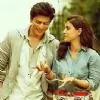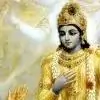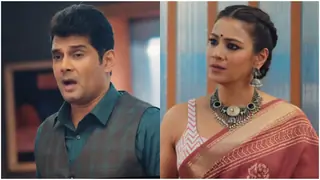Duryodhana is always portrayed by story-tellers as the ultimate embodiment of all conceivable evil. Indian mythology is strongly footed in character creation- there are no perfect' heroes nor perfect' villains. All heroes have erred and all villains have excelled at some point in time or the other. Duryodhana is a very good example of this. He was indeed a perfect villain when it came to dealing with his cousins, but far from it on many other occasions.
His best quality was the character of his friendship. One could argue that his crowing Karna as the King of Anga was just to ensure that a worthy rival is fielded to face Arjuna. If it was so, he would have ditched Karna later. But we see Duryodhana and Karna sharing an unbreakable bond of friendship through their successes and failures. It was Karna's death that Duryodhana mourns more than that of even his brothers - a true testimony of the friendship.
I don't doubt Duryodhan's friendship w/ Karna, but Karna never showed himself as unworthy of facing Arjun, and so Duryodhan never got a reason to abandon him later. Yeah, he loved Karna more than even his own brothers: on day 14, when Bhima was pummelling Karna (contrary to what they show on TV), Duryodhan sent several of his brothers to defend him, even if it meant sending them to their deaths.
But when he was dying & Ashwatthama got to him the news of the deaths of the Pandava army, he congratulated him on doing what even Karna failed to do.
Duryodhana's claim to the throne is not entirely unfounded. Duryodhana had a genuine right for the throne as the son of Dhritharashtra, the eldest of his generation. Dhritarashtra did not get the first right to the throne only because blindness rendered him ineligible. But that cannot be held against his children. Dhritarashtra may not have been the first king, but he was indisputably the elder brother. And it is the offspring of the elder brother, who has the first claim on the crown. Moreover, the Pandavas were not truly the children of Pandu. They were born to five different Devas who have no lineage connected to Hastinapura. So their claim was suspect, if not void. So, was Duryodhana wrong in staking his claim?
This has been debated ad nauseuam in the previous thread on Duryodhan, so I refuse to go into that again. Only thing I will say - the next sentence following this is true - Duryodhan was a good administrator, contrary again to what the serials show.
Duryodhana was accepted as a fair administrator. It is evident on many occasions except when his cousins were present - their presence always clouded the vision of Duryodhana.
This is precisely why the 2 kingdom solution - Hastinapur & Indraprastha - was the fair resolution to the conflict. Dhritarashtra was blind while Pandu had abdicated, so the claims of either of their sons was unclear. Under the circumstances, Bheeshma did the best thing possible - give each of them their kingdoms.
It was a win-win situation - Dhritarashtra got to see his son rule, Duryodhan got to rule and succeed that line of Vichitravirya, while the Pandavas too lived independently of him and didn't have to worry about assassination attempts on them. Had he taken it, he would have lived long w/ his brothers, wouldn't have had to see the death of his near & dear ones - be it Karna, Laxmana, Dushashan, Shakuni, and be isolated in battle. Unfortunately, his visit to Indraprastha filled him w/ envy. In this, I blame Yudisthir as well - there was no need to invite Duryodhan @ all. Yeah, it may have violated some utopian model of dharam that Yudisthir had in mind, but that violation would have saved him the lives of all his sons, Drupada, Dhrishtadyumna, Virata, Kuntibhoj, Vridhakshetra, Sveta, Sankha, Uttar, Satanika, and a whole host of other relatives & allies. Including some of their favorites on the other side, like Shalya.
Had Duryodhan been an adequate ruler, he'd have recognized this, or else, tried conquering Indraprastha by force. He'd have had a better chance of winning had it not been a dharamyudh. He'd also have done well to understand Steven Covey's theory of win-win solutions, which is the only stable state of a conflict in the long term
He has also taken more than his share of blame for many events. For example, when he lured the Pandavas for a game of dice, Yudhishtira accepted the challenge saying that it is unbecoming of Kings to refuse a game of dice. Using the same logic, Duryodhana is well within the dharma to throw that challenge.
What exactly was his goal? Was it Indraprastha, or was it enslaving the Pandavas, or was it Draupadi? If it was Indraprastha, he should have ended it once he got it, and not continued w/ the Pandavas. If it was enslaving the Pandavas, he should have stopped after he won Yudisthir - Draupadi would still have been his maid (but not for sexual favors). If it was Draupadi, the entire premise of this essay is gutted, but still... as someone else once suggested, he could have then given the Pandavas back everything except Draupadi, and left them completely humiliated. The courtroom humiliation of Draupadi was still totally unjustified.
We should also recognize that Duryodhana faced prejudice of all elders all through his life. The bad omens at the time of his birth created prejudice in the mind of Bheeshma and Vidura who recommended that the child be abandoned. Drona was strongly biased towards Arjuna and dead against Karna who was identified with Duryodhana.
Which would seem to suggest that he was a moron for taking into his army his ill-wishers. Bheeshma led his army on the condition that he'd not kill the Pandavas, and he'd not let Karna participate. If Duryodhan had that much confidence in Karna, he should have released Bheeshma from his service & told him to go join the Pandavas. Equally moronic was Duryodhan trying to win Shalya to his side, knowing where his loyalties lie. Yeah, Shalya killed Uttar & fought & died for him on day 18, but in his role as Karna's charioteer, he did what he could to sabotage Karna. Had Shalya tried pulling out Karna's wheel, Karna wouldn't have been killed.
Even if he had released Bheeshma, he'd still have had Drona, who couldn't have joined the Pandavas since they were filled w/ his enemies from Panchala, as well as Kripacharya & Ashwatthama. In the war, it was Drona & Ashwatthama who killed everyone who was anyone in the Pandava side. Then there were a host of lethal warriors he had on his side - Jayadrath, Bhurishrava, Bhagadatta, Shrutayudha, Alambusha and so on.
If I was prejudiced against by people who were willing to fight & die for me, I'd consider myself lucky. Some prejudice.
In the course of the great war, Duryodhana was more fair than his cousins. The most notable of the events that prove this happened on the 18th day of the war. When the Pandavas traced Duryodhana at the fag end of the war, he was staring at certain defeat. At that point, Yudhishtira made the most stupid offer to Duryodhana that he could pick any of the five Pandavas for a duel (gada yudha). And should Duryodhana win, it would be deemed as having won the Kurukshetra war. It was impossible for any of the four Pandavas other than Bheema to even give a challenge to Duryodhana. Even Bheema's ability to win a duel was uncertain. Duryodhana, as a true and fair warrior, did not take advantage of the offer. He chose Bheema because that would make the duel even and fair. Of course, the Pandavas did not respond in the same way. Bheema killed Duryodhana by smashing his thigh - unfair means to down an enemy in gada yudha in which hitting below the waist is not allowed.
That is arguable. It's just as likely that having lost everything, he lost the will to live either, and just wanted to fight to avenge everybody's deaths. The reason he chose Bhima was that he hated Bhima the most: for 13 years, he had been practicing his skills on a statue of Bhima. So come this last battle, he wasn't gonna let that opportunity go waste.
As for Bhima, Duryodhan knew that he had taken a vow to destroy his thighs, and he knew that both sides had cheated throughout the war. So it's his fault for exposing his thighs in battle.
As Mark Antony says "The evil that men do lives after them, The good is oft interred with their bones" (Julius Caesar, William Shakespeare)
Tail piece : Duryodhana was originally named "Suyodhana" meaning great warrior. Duryodhana means one who cannot be fought against'








































